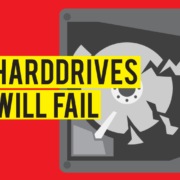It only took a few hours after launching, but Google Drive, the new cloud storage service, is already facing widespread criticism when it was discovered that the search giant owns its users’ files the moment they are uploaded.
This is not the first time Google has dealt with privacy concerns, and it certainly won’t be the last. However, while past allegations have mostly surrounded users’ personal information and how Google uses it, this controversy has to do with users’ personal uploaded files and data, and what Google can potentially do with this information.

In order to understand the extent to which Google controls your data, it’s first important to examine Google’s Terms of service, as well as KineticD’s for comparison:
KineticD’s Terms of Service – for full terms, click here:
“END USER acknowledges and agrees that all materials, including without limitation, information, data, software, music, sound, photographs, graphics, video, and email messages or other kinds of messages (collectively, “Content”), whether publicly posted or privately transmitted, are the sole responsibility of END USER.”
Google Drive’s Terms of Service – for full terms, click here:
“Your Content in our Services: When you upload or otherwise submit content to our Services, you give Google (and those we work with) a worldwide licence to use, host, store, reproduce, modify, create derivative works (such as those resulting from translations, adaptations or other changes that we make so that your content works better with our Services), communicate, publish, publicly perform, publicly display and distribute such content.
The rights that you grant in this licence are for the limited purpose of operating, promoting and improving our Services, and to develop new ones. This licence continues even if you stop using our Services (for example, for a business listing that you have added to Google Maps).“
While it is made very clear throughout the first paragraph that Google does indeed own your data the second it’s uploaded, the last sentence is potentially even more concerning than any other area of the terms.
In that sentence, Google never clearly defines what exactly it can do with your data, and they only provide one simple example of a Google Maps listing, while leaving the rest open to interpretation.
Without a clear definition of boundaries, it seems that Google can simply do what it chooses to with your data, and the wording in these terms expunges them from any legal obligations.
It’s important to note at this point that while Google has done a commendable job of providing free services for over a decade now (seriously, no company provides more free and useful services), there really is no such thing as a free lunch, as they say.
“If you’re not paying for the product, you are the product”
This saying has never rung truer than it does in today’s digital age, especially in Google’s case. If you are not paying for a service, then you, and more importantly, your data, is the product that is being sold. With Gmail, Google Search, Google+, Google Maps, Google News, and so many other “free” data-gathering products already at their disposal, adding Google Drive to the arsenal is just the next logical piece to be added to the massive data mining puzzle.
With that in mind, and considering Google’s checkered past regarding privacy issues, it’s more necessary than ever to read the fine print and always understand who really controls your files, and what, exactly, they can potentially be used for.








Leave a Reply
Want to join the discussion?Feel free to contribute!